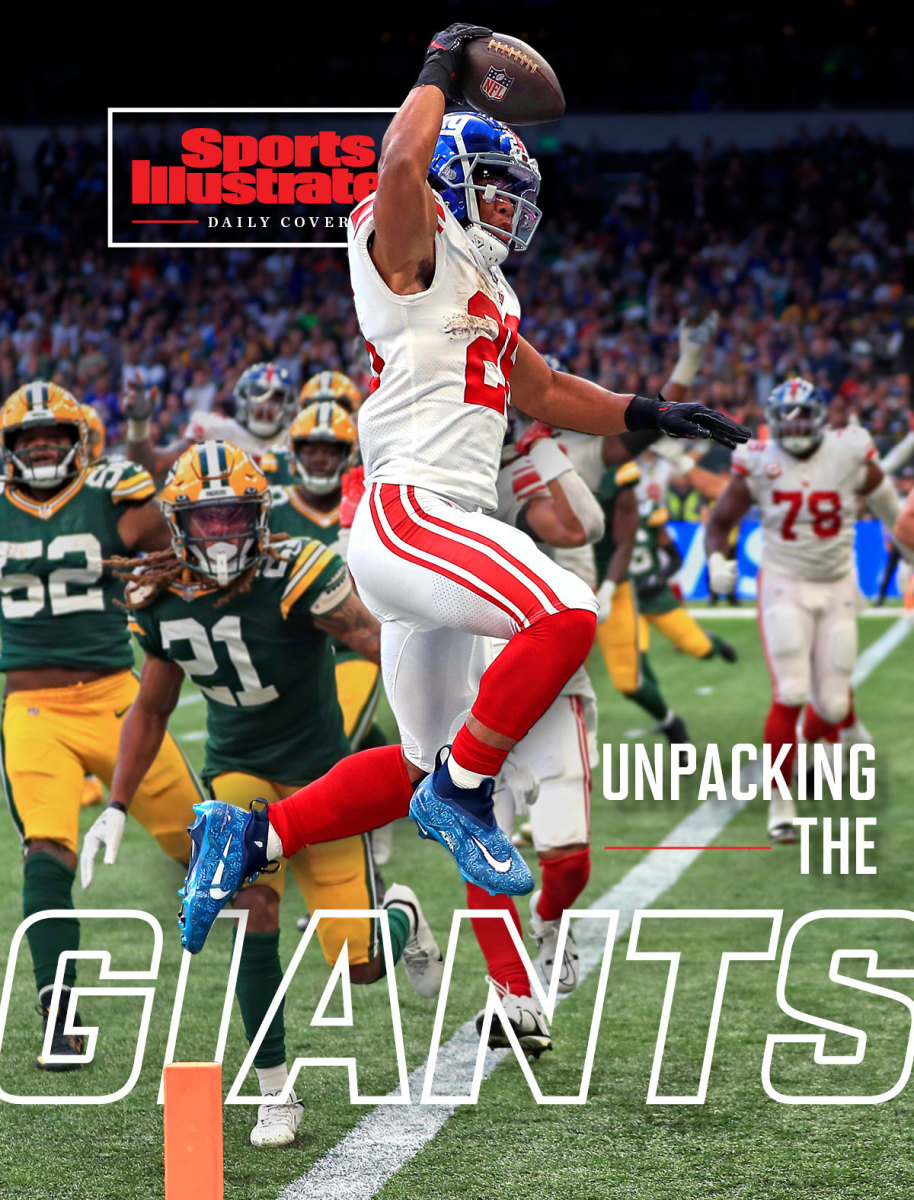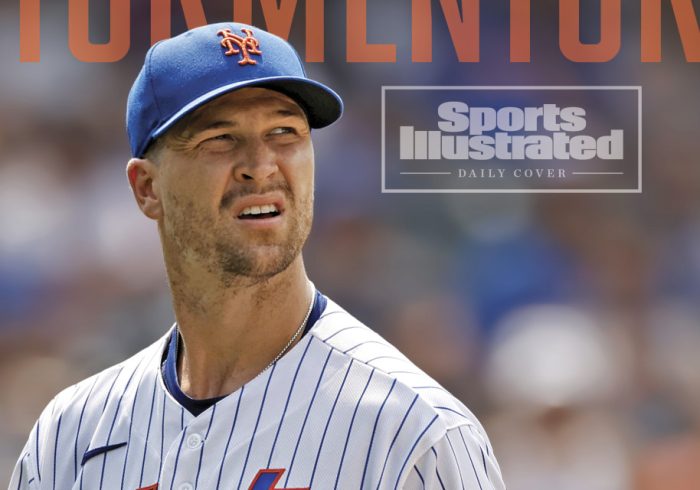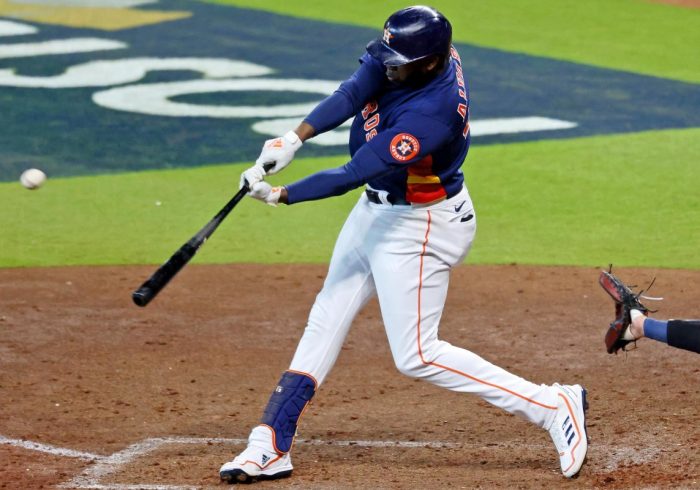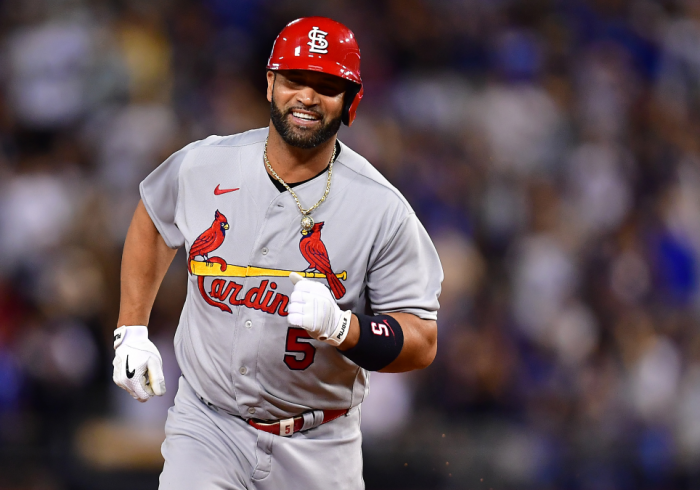Good morning, I’m Dan Gartland. I have to say, I’m surprised that the road teams won three of the four wild-card series.
In today’s SI:AM:
🇫🇷 Victor Wembanyama is for real
Better luck next “ear”
MLB has to be thrilled with how its first expanded postseason has gone.
The clinching wild-card round games featured, among other things, a 15-inning nailbiter, a seven-run comeback and, last night, a historically dominant outing by a starting pitcher.
Starting pitching was supposed to be the Mets’ strength, but it was the Padres’ rotation that won them the series. San Diego went up 1–0 after Yu Darvish allowed one run over seven innings in Game 1. Then, in the do-or-die Game 3 last night, Joe Musgrove allowed just two base runners (one hit, one walk) in seven innings of work as the Padres won 6–0. He’s the first player in baseball history to pitch at least seven innings and allow fewer than two hits in an elimination game.
Musgrove was so good that Mets manager Buck Showalter asked the umpires to check him for illegal substances before he took the mound in the sixth inning. Musgrove’s ears looked shiny on the ESPN broadcast, and his spin rates were elevated, which led to the strange sight of crew chief Alfonso Márquez rubbing the pitcher’s ears. Márquez determined that Musgrove was clean.
“I get it, dude,” Musgrove said after the game. “They’re on their last leg. They’re desperate.”
Of course the Mets were desperate. The loss brought an end to a nightmarish stretch of baseball that saw them lose their big lead in the NL East and force them into the crapshoot of a three-game series. It was an especially frustrating way for the Mets to conclude what was still one of the best seasons in franchise history (101 wins, second only to the 1986 team’s 108). Stephanie Apstein was in the clubhouse after the loss and wrote about the sense of uncertainty that hung in the room. With several key players set to hit free agency—including Jacob deGrom, Brandon Nimmo and Edwin Díaz—next year’s team is going to look a lot different, and it’s fair to wonder if the Mets will be able to replicate this year’s success.
But back to Musgrove. His performance was historically dominant, but he wasn’t the only pitcher to go deep into a game this weekend. In the seven wild-card round games, five pitchers lasted at least seven innings. In the entire 2021 postseason, only four pitchers made it that deep into a game. If that trend continues, it’ll make for a really compelling postseason. The playoffs are always better when you can tell the story of a game through a starting pitcher.
The best of Sports Illustrated
In today’s Daily Cover, Albert Breer explains how the partnership between Daniel Jones and Brian Daboll has helped the Giants become the NFL’s biggest early-season surprise:
In May, collectively, [GM Joe] Schoen and Daboll made the decision to decline the fifth-year option on Jones’s rookie contract, effectively setting him free after this year.
If Jones was put off by all that, it would be understandable. Instead, he and Daboll did something novel in the aftermath of that decision. They acted like adults. They built a relationship and they got ready to work together.
Richard Johnson broke down Texas A&M’s predictable final play that allowed Alabama to survive and remain undefeated. … Two games in Las Vegas were enough to convince Jeremy Woo that No. 1 NBA draft prospect Victor Wembanyama is the real deal. … Emma Baccellieri was in St. Louis, where the MLB careers of Albert Pujols and Yadier Molina came to an anticlimactic conclusion.
Around the sports world
Yankees reliever Aroldis Chapman has been left off the team’s ALDS roster after he failed to show up for a workout. … Yankees GM Brian Cashman was asked about Aaron Judge’s impending free agency but didn’t really say much. … Mookie Betts is entering the playoffs on a hot streak. He just bowled a 300 game. … The Lightning have suspended defenseman Ian Cole amid allegations of sexual misconduct. … Baker Mayfield stunk again against the 49ers.
The top five…
… things I saw in the NFL yesterday:
5. Tony Pollard’s 57-yard touchdown run with three broken tackles.
4. Darnell Mooney’s one-handed catch.
3. Josh Allen’s perfect throw over two defenders to hit Gabe Davis in stride for a 98-yard touchdown.
2. Taysom Hill’s 60-yard run for his fourth touchdown of the game (three running, one passing).
1. Justin Tucker’s postgame interview after yet another game-winning field goal.
SIQ
On this day in 1904, Boston Americans pitchers George Winter and Bill Dinneen threw complete games in both ends of a doubleheader against the New York Highlanders to give Boston the record for most complete games by a team in a season. How many complete games did Boston pitchers throw that season?
- 124
- 137
- 148
- 154
Friday’s SIQ: On Oct. 7, 2012, which quarterback broke Johnny Unitas’s 52-year-old record for most consecutive games with a touchdown pass?
- Peyton Manning
- Tom Brady
- Drew Brees
- Ben Roethlisberger
Answer: Drew Brees. Unitas’s record was 47 straight games from Dec. 9, 1956, to Dec. 4, 1960. Brees’s 40-yard strike to Devery Henderson in the first quarter against the Chargers gave him touchdown throws in 48 consecutive games, dating back to Oct. 18, 2009. He would eventually run the streak to 54 games before it was snapped in a lousy five-interception game against the 11–1 Falcons in Week 13 of the ’12 season.
Brees’s 54-game streak remains the longest in NFL history, although two other guys have since surpassed Unitas’s old mark: Tom Brady (52 games) and Peyton Manning (51).
But here’s what is really unbelievable about Brees’s streak. After it was snapped against Atlanta, he went out and started another streak that was almost as long. From Dec. 9, 2012, to Nov. 29, 2015, Brees threw for at least one touchdown in 45 straight games, just two games shy of tying Unitas’s old record again.
From the Vault: Oct. 10, 2005
I’m wondering what would have to happen for Alabama to ever be considered “back” again. But in 2005, the Tide really were back.
Bama hadn’t been ranked No. 1 since 1992 and had recently suffered through two particularly bad seasons (3–8 in 2000 and 4–9 in ’03) before Brodie Croyle and the gang turned things around in ’05.
In Week 5 of that season, No. 5 Florida, in its first season under Urban Meyer, paid a visit to Tuscaloosa and got trampled by Alabama, 31–3. The win vaulted the Tide to No. 7 in the AP poll, their highest in-season ranking since they were No. 5 in 1999. Bama was, indeed, back. And, as Mark Beech wrote in his cover story, Croyle was the star:
By the time he left Bryant-Denny Stadium with his family on Saturday, long after the last delirious echoes of Rammer Jammer Yellow Hammer had faded, Brodie had served notice that he is among the best quarterbacks in the country. In the biggest game at Alabama in nearly a decade, the 6’3″, 205-pound senior made seemingly every throw in the book—from the shovel pass to the bomb to the frozen rope—and he did so with remarkable accuracy. Florida entered the game with the nation’s 12th-ranked pass defense, but Croyle spent the afternoon poking holes in it, completing 14 of 17 throws for 283 yards and three touchdowns. “He has as good an arm as anybody I’ve ever been around,” said Crimson Tide offensive coordinator Dave Rader, a veteran of 20 college coaching seasons. Added Florida coach Urban Meyer, “He’s an NFL quarterback, and he played like it.”
Croyle was an NFL quarterback—a terrible one, but an NFL quarterback. He was just what Alabama needed, though. The Tide’s defense had been among the nation’s best the year before, but with Croyle missing the final nine games after tearing his ACL against Western Carolina, Alabama’s offense struggled, and the team finished 6–6. But the senior quarterback’s performance against Florida had people excited:
With Croyle healthy again and in command of the offense, there is a buzz around Alabama football that has been missing for much of the last decade. After winning 12 national championships and 20 SEC titles from 1925 to 1992, the Tide has won only one conference crown in the last 13 years.
Looking back, Alabama’s renaissance really did begin with Croyle. The Tide went 10–2 that year and beat No. 18 Texas Tech in the Cotton Bowl. After a disappointing 6–6 regular season in 2006, coach Mike Shula was fired. That paved the way for Nick Saban to take over, and the rest is history.
Check out more of SI’s archives and historic images at vault.si.com.
Sports Illustrated may receive compensation for some links to products and services on this website.



